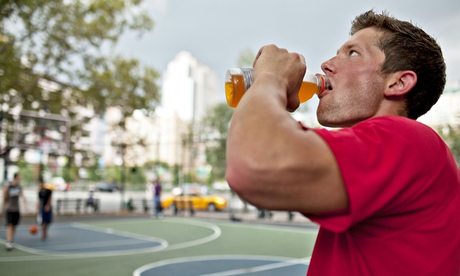
When did water stop being the best drink for quenching your thirst? It’s cheap, has no calories and a US independent Beverage Guidance panel ranked it top for its “contribution to intake of energy and essential nutrients” and for “its positive effects on health”. In comparison, sports drinks were way down the list, just above “sweetened, nutrient-poor drinks” such as Coca-Cola. Yet sports beverages – flavoured, often brightly coloured drinks containing carbohydrates, minerals, electrolytes and sometimes vitamins, are widely promoted at sporting events and by sports personalities. But do they really improve your sporting performance? Last week, the Australian authors of a paper in the Journal of Medical Ethics argued that “sponsorship could mislead the public into thinking these products work well and/or are good for health – for which there is no strong scientific evidence”.
An advert earlier this year claiming Lucozade Sport “hydrated you and fuels you better than water” was banned by the Advertising Standards Authority, which ruled it was misleading. Meanwhile, pediatric journals warn that the acidity in sports drinks erodes teeth enamel and encourages obesity – a 500ml bottle of Lucozade Sport contains 17.5g of sugar (a teaspoon is 4g). An analysis by Carl Heneghan’s team at Oxford’s Centre for Evidence-Based Medicine of 1,035 web pages with 431 performance-enhancing claims for 104 different products (a mixture of sports drinks, supplements, trainers and clothing) found only three studies out of 146 were high quality and at low risk of bias. The team concluded there was insufficient evidence for the health benefits of any of the claims. Meanwhile, an investigation into sports drinks by the BMJ two years ago concluded that people who avoided sports drinks could well get thinner and run faster.
The solution
Sports drinks do not provide any benefit when compared with water if you are exercising for 90 minutes or less. Water will rehydrate you just fine, without the added sugar. You also don’t need to stock up on fluids “just in case”. While dehydration is a risk in endurance exercise, the body’s thirst mechanism can be trusted to prevent it. A study of cyclists in time trials found that relying on thirst (drinking to thirst, as it’s called) to replace fluid produced a better performance than either over or under-drinking.
While it’s clear that non-elite athletes don’t need sports drinks, it is not obvious they are essential to anyone at all. A paper in the journal Sports Medicine in 2013 said that while experts had created lots of guidelines, there wasn’t much evidence on how they were used in the real world. The few studies that exist vary enormously and journals often don’t publish negative studies – those that don’t show a benefit – because they’re considered boring. So until there is evidence, you don’t need to feel less of an athlete for not clutching a branded bottle.

